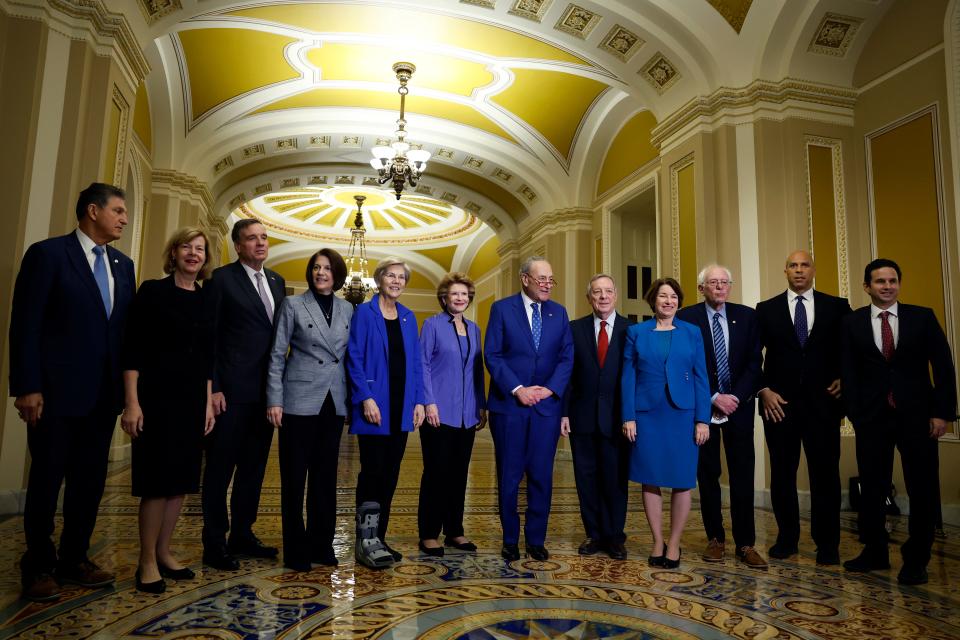Trump's influence looms large as Michiganders eye open US Senate seat
Like so much of recent politics in Michigan and across the nation, the looming campaign to decide who wins U.S. Sen. Debbie Stabenow's seat in 2024 is going to be defined, at least in part, by — you guessed it — Donald Trump.
The question may come down to just how much he's involved.
"I would say to him if you want the (Republican) Party to win and you believe in your legacy and the legacy of the party, you have to let the chips fall where they may (when it comes to picking a nominee)," said John Truscott, a lifelong Republican and Lansing-based consultant who served as spokesman to former Gov. John Engler.
The Michigan Democrat's announcement on Thursday that she would not run for a fifth six-year term sent reverberations across the political landscape and touched off rampant speculation about how the campaign for the office will play out. Senate Republicans are expected to have a strong year; in a presidential election year, the race will also be impacted by each party's nominee for chief executive and how they are perceived.
Trump's role in that — whether it's a direct or indirect one, whether he wins the GOP presidential nomination or stumbles — will be part of the equation.
Certainly, the Republican former president's endorsements didn't help much in last year's elections: In Michigan, his three top-of-the-ticket candidates lost as did his hand-picked nominee for a newly drawn west Michigan congressional seat as Democrats took back legislative control in Lansing. In U.S. Senate races in Arizona, Georgia, Nevada and Pennsylvania, his picks won primaries and then lost.

In the race for Stabenow's seat, the GOP will face an even tougher task. It is running against historical headwinds — only one Republican, Spencer Abraham, has won a U.S. Senate seat in Michigan in the last 45 years and he held it for only a single term — and a remarkably strong bench of potential Democratic candidates, mostly women, many of whom, in their own way, trace their ascent to the Trump revolt in the state in 2018.
"When Trump was elected (in 2016), it activated women," said Abby Clark, a Michigan Democratic political operative. "The women's march and everything, it activated women in politics on a scale that hadn’t happened previously, both as activists and as candidates," Clark said. "That strength has continued."
So there are plenty of Republicans who would like to see Trump stay out of the race. But with Trump running for president again and Michigan no doubt in his sights, it's near certain he'll expect a say in who the Senate candidate is. He's also likely to have sway in the state Republican Party, with the candidates vying for state party chair almost entirely made up of staunch Trump supporters. That could result in a circumstance where the party leans hard toward a pro-Trump candidate again.
"The state party chair decision could shape this Senate primary (for the Republicans) in terms of how much they back a particular candidate," said David Dulio, political science professor and director of the Center for Civic Engagement at Oakland University.
A new Congress with new priorities: What to know about Speaker McCarthy and the fate of Biden's agenda
Debbie Stabenow retirement:Who's in, who's out on 2024 US Senate race

The current state Republican Party chairman, Ron Weiser, said he has "no doubt" that the GOP will nominate "a strong, competitive candidate" and they have some potentially strong candidates. The question is whether GOP voters — and a base that still may be smitten with Trump — chooses one of them if he endorses someone else.
"We have a huge bench and are riding high," said former Gov. Jim Blanchard, a Democrat. "The Republicans have absolutely cratered in Michigan."
Democrats face their own challenges with a large field
Even with an embarrassment of riches when it comes to potential candidates and history on their side, Democrats have no guarantee of holding onto Stabenow's seat. Handicappers believe at this point it could be a good year for Senate Republicans, with Democrats defending 23 seats to just 10 held by Republicans.
Then there's the question of what happens if a lot of those Democrats decide that U.S. Senate seats come open so rarely that 2024 is their year to run. That could lead to a divisive primary pileup, which could weaken a potential nominee or produce one with less general election appeal statewide than might otherwise be the case.
Gov. Gretchen Whitmer says she's not in the race but U.S. Reps. Elissa Slotkin, of Lansing, Haley Stevens, of Birmingham, and Debbie Dingell, of Ann Arbor, are all considering it. It's easy to see Secretary of State Jocelyn Benson and Attorney General Dana Nessel taking a hard look as well. Expect Lt. Gov. Garlin Gilchrist to consider it. And there's more.
"It’s a very strong bench, we’ve got a set of real up-and-comers right now," said Clark. "I think stronger than we have (had) in years. People are calling each other and talking a lot. ... There are a half-dozen names that people are asking about. (But) that's also really tough."
Clark noted that, eight years ago, when the late U.S. Sen. Carl Levin retired, institutional Democrats quickly coalesced around U.S. Sen. Gary Peters, then a congressman. Peters avoided what could have been a bruising primary and beat Republican former Secretary of State Terri Lynn Land. He was the only Democrat to win an open Senate seat that year.
Kelly Dittmar, director of research at the Center for American Women and Politics at Rutgers University and a graduate of Aquinas College in Grand Rapids, is skeptical Whitmer is definitely out, but said even if she doesn't run, she's in a prime spot to help the Democrats settle on a preferred candidate.
Dittmar, who co-authored the 2018 book, "A Seat at the Table: Congresswomen's Perspectives on Why Their Presence Matters," suggested Stabenow may have her own plan for a successor and that making an announcement so early in the election cycle could be part of that. Dittmar immediately mentioned Slotkin as a possible early favorite. But she also noted Whitmer, Benson and Nessel as well. Those latter three, along with Stabenow, coordinated their campaign efforts in 2018, she noted. If they do so again, it could play a role in avoiding a confrontational primary.
"I would love to hear the conversations among those women. Because it wouldn't surprise me that they would — not coordinate, but have a little more camaraderie in this decision," she said.
Republicans need to address divisions but will they?
The problem for Michigan Republicans is clear enough. With the ascent of Trump and his stunning victory in the state in 2016, his supporters have largely taken control of the party apparatus and proven to be a formidable voting bloc in party primaries.
But those candidates, often anti-establishment and sowing doubts on the outcome of the 2020 election, which Trump lost to President Joe Biden, have failed in statewide races and struggled in all but the most staunchly Republican areas. And old guard Republicans, not to mention some donors, in some cases have stayed away.
It hasn't hurt grassroots interest. In last year's governor's race, 10 people filed for the GOP primary (five were ultimately excluded for having problems with petition signatures). But none were prominent Republicans with significant political experience or a wide political base, and several parroted Trump's baseless claims of a stolen election. One was charged in connection with the Jan. 6, 2021, attack on the U.S. Capitol to try to halt Congress from certifying Biden's election.
Ultimately, businesswoman Tudor Dixon, with support from the powerful DeVos family (and, later, Trump's endorsement) won the Republican primary. But that support never translated into votes: She lost to Whitmer by more than 10 percentage points.
"Why are we assuming the primary for Senate would look any different?" asked John Sellek, who has worked as a political consultant on Republican campaigns and is CEO of Harbor Strategic, a public relations firm in Lansing.
The potential Republican field is far less certain than the Democratic one, even. Dixon will receive some interest, without question; any of the other gubernatorial candidates, say Kevin Rinke or former Detroit Police Chief James Craig, could throw their hats in the ring. U.S. Rep. John James, who ran unsuccessful-but-strong U.S. Senate campaigns in 2018 and 2020 could jump in, though for now he's not expressing overt interest.
Of those, however, it's hard to see anyone other than James, who has had Trump's endorsement in the past, potentially scaring off a much wider field.
But there are, or could be, others who could have a chance of being strong general election nominees if they could get through a primary: Recently retired U.S. Rep. Fred Upton, R-St. Joseph, would be a formidable candidate if he decided to run. So would former U.S. Rep. Peter Meijer, R-Grand Rapids. But both voted to impeach Trump for inciting the Jan. 6, 2021, attack on the U.S. Capitol and would incur the wrath of his voters on the campaign trail.
Could either split a crowded ticket and win? It's possible. It's also possible that someone who isn't part of the current political scene could surface, the way Rick Snyder did in the 2010 governor's race. But that would mean that Republican voters — and enough of Trump's base — were willing to move on from Trump and the claims about the 2020 election to let that happen.
Dulio said for both parties, one thing is for certain: Stabenow's announcement is going to force a lot of people to make decisions quickly.
"People will start raising money pretty darn quick. They will have to make a decision (whether to get in) faster than many would like to," he said. "You'd like the 118th Congress to be about governing, instead of feeding the permanent campaign. But that's what happens these days. When somebody announces their retirement, it's immediately, 'Who's next?' "
More politics coverage from USA TODAY
New Mexico Democrats' homes, offices targeted in shootings under investigation by police
Proud Boys on trial for charges stemming from Jan. 6 Capitol riot. What we know.
Fentanyl killed 70,000 in US. With Biden in Mexico, can neighbors cooperate to stop flow?
A near-fight on House floor, other dramatic moments caught on camera in McCarthy speaker saga
Contact Todd Spangler: [email protected]. Follow him on Twitter @tsspangler.
This article originally appeared on USA TODAY: Stabenow retirement will lead to Trump defining open US Senate seat
